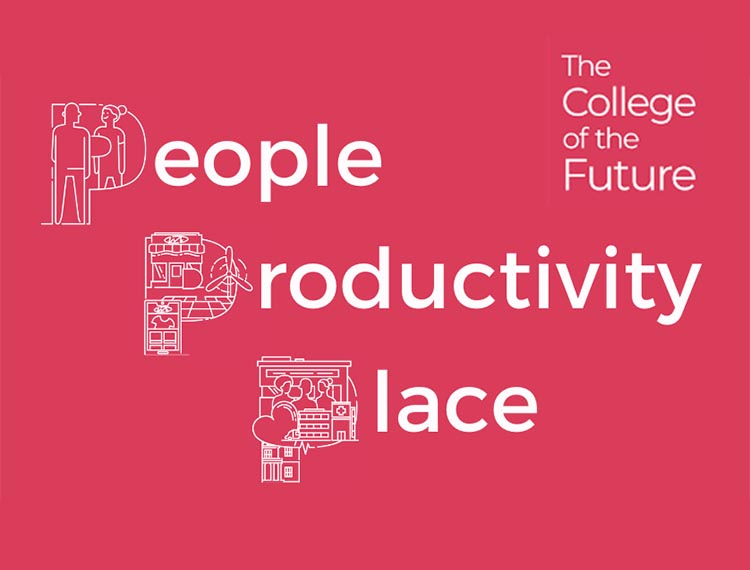Independent Commission on the College of the Future launch People, productivity and place: a new vision for colleges

@CollegeComm – The UK needs a new vision for colleges to drive a green economic recovery and better living standards
Geoff Barton (General Secretary of the Association of School and College Leaders), Lord Bob Kerslake (Former Head of the UK Government Civil Service) and Mary Curnock Cook OBE (Former Chief Executive of UCAS) have come together to contribute to a report shining a spotlight on the transformative role that colleges must play in economic recovery, and future prosperity and sustainability.
The publication supports the launch of a new vision for colleges across the UK from the Independent Commission on the College of the Future. The commission will be setting out recommendations this autumn to achieve this vision in the next decade as people and the labour market emerge from the pandemic.
A coalition of experts from across education, business and trade unions, are together calling for a new bold and ambitious strategic remit for colleges to empower people with opportunities for lifelong learning and support, to boost productivity, and to strengthen every community’s sense of place.
The OBR last week predicted that in a worst-case scenario unemployment could treble by the end of this year and have long term scarring effects. The full potential of colleges must be unlocked for recovery and to meet long-term challenges that will remain, such as regional inequalities, the climate emergency, and the changing demands of the labour market.
Leading voices from across the education system who have contributed to the People, productivity and place: a new vision for colleges report are united in the transformative role that colleges can play and are calling for greater collaboration across the education and skills system.
Mary Curnock Cook OBE (Former Chief Executive of UCAS and Education non-exec Director) says that universities and colleges should work harder together to provide the education and skills needed for recovery.
Meanwhile, Geoff Barton says there is too often a disconnect and competition between schools and colleges and calls for a shared responsibility to support young people to thrive.
The Independent Commission on the College of the Future’s vision – launched in the report and video – responds to key opportunities for change across the four nations.
The Commission, led by the UK’s National Statistician Sir Ian Diamond, believes the college of the future will be central to driving a fairer, more sustainable and more prosperous society:
- For people, colleges will be a touchpoint for everyone throughout their lives as the world changes.
- For productivity, colleges will provide strategic advice and support for employers to drive business change, innovation and future workforce planning.
- For place, colleges will have the resources and funding to play an even greater role in fostering healthy and connected communities.
Sector Response
 Sir Ian Diamond, Chair of the Independent Commission on the College of the Future, said:
Sir Ian Diamond, Chair of the Independent Commission on the College of the Future, said:
“The vision we set out today has the potential to transform lives and communities, increase productivity and innovation and crucially give the country the best possible chance of thriving in ten years’ time.
“In each of the four nations we have an opportunity to unlock and invest in the potential of colleges. This builds on a vast array of work across the four nations. We have a real opportunity to build on where it works and to learn together. This is vital if we are to recover from the impacts of COVID-19 and to face longer-term challenges that will remain long after the pandemic has passed.
“Now we have set out our vision for colleges, we are consulting with the education and skills sector, employers and beyond to build a roadmap for how to achieve it, with recommendations for each of the four nations.”
 Chief Executive of AoC, David Hughes said:
Chief Executive of AoC, David Hughes said:
“The vision set out by the Commission is a clarion call for all of us to work together to ensure that every person, place and employer has the college they need. It’s a huge step towards giving colleges the long-term position and funding they need to deliver their best.
“As the country emerges from the pandemic and people consider their futures, the vision sets out the vital role colleges will play in our labour market, economy and communities. Every young person and adult should be able to look to their college for the education, skills and support to find work they need. Working with businesses, universities and others will be key components as discussion turns towards the white paper in the autumn.”
Amanda Melton, Commissioner and Principal and Chief Executive, Nelson and Colne College Group, said:
“For too long colleges in England have not had the recognition and investment that they deserve – representing a tremendous lost potential. The UK Government’s FE White Paper for England presents a critical opportunity for boldly affirming the role and mission of colleges, alongside universities, to meet the education, skills and training needs of everyone throughout their lives. The vision we launch today marks a moment when our sector is saying that, with investment and reform, we can together deliver more for people, productivity and place.”
Marie-Thérèse McGivern, Commissioner and former Principal and Chief Executive of Belfast Metropolitan College, said:
“Colleges play a vital role in solving fundamental problems related to social mobility and productivity in Northern Ireland. We have made great progress in strengthening our skills system and meeting the needs of employers. As a Commission we have drawn a great deal from the real strengths of the system here, including through curriculum hubs and the central role Northern Ireland’s colleges play in innovation. The ongoing development of a new skills strategy will be enhanced by ensuring we speak to the role of colleges for people, productivity and place.”
David Jones OBE DL, Former Principal and Chief Executive of Coleg Cambria, said:
“Colleges are the solution to addressing so many of the skills and broader challenges we face at present, and with effective leadership they have the potential to play an even greater future role. In Wales we need to grasp the opportunity and play our part alongside schools, universities and other training providers in moving towards a bold post compulsory education and training sector, building on the fantastic work our colleges already do for public good and to support prosperity. This vision has an important part to play in shaping and contributing to the future skills system in Wales.”
Audrey Cumberford MBE, Principal and Chief Executive of Edinburgh College, said:
“Colleges make an incredibly significant contribution to the Scottish economy. But to realise the full benefits of this, as Paul Little and I were clear in our joint report earlier this year, we need to develop a coherent tertiary systems approach, which is agile, collaborative, inclusive. As the Scottish Funding Council reviews the tertiary system, the vision the Commission launches today affirms this broader strategic mission for colleges as part of a collaborative system – with a central role in lifetime learning and high-quality strategic support for employers.”
 Kirsty Williams, Minister for Education in Wales said,
Kirsty Williams, Minister for Education in Wales said,
“During this pandemic our colleges have continued to serve the needs of their students and have provided essential support to the wider community.
“I was pleased to have met with the Independent Commission last year, and to see them continuing to think creatively in a four nations way.
“I look forward to receiving the commission’s final report which I am sure will confirm how our colleges can continue to play a pivotal role in our education system, serving learners of all ages, utilising digital technology and the importance of the role they play within their community.”











Responses